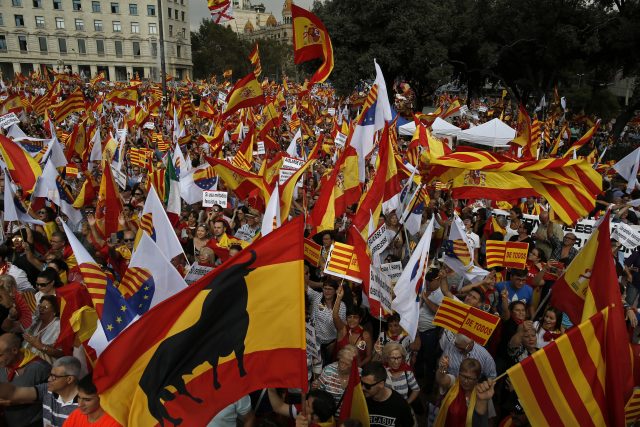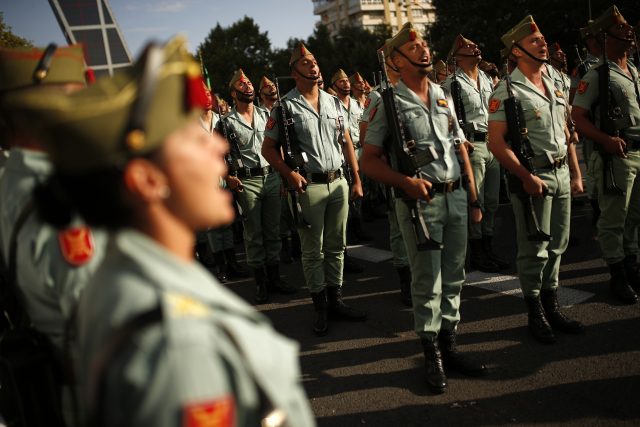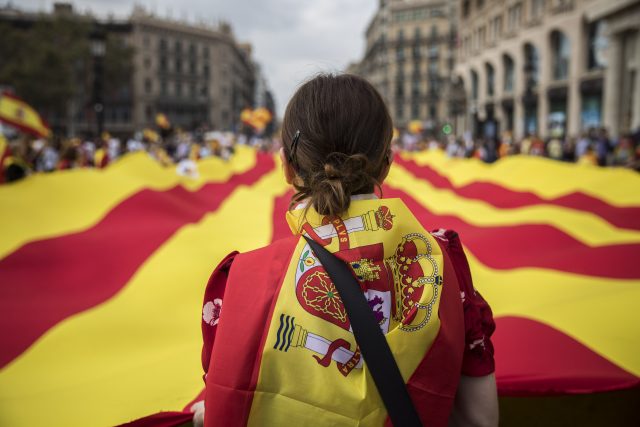Thousands of Catalans who want their region to remain in Spain marked the country’s national day on Thursday, marching through Barcelona waving both Spanish and Catalan flags and shouting “I am Spanish”.
Meanwhile, in the national capital Madrid, troops and police paraded in front of King Felipe VI, accompanied by national and regional politicians.
Thousands of people waving Spanish flags lined the pavement of Madrid’s Paseo de la Castellana avenue for the military parade amid crisis in Spain over Catalonia’s vote for independence in a referendum considered illegal by national authorities.

Spain is waiting for a response to a government request to Catalonia’s leader to clarify by Monday if he has already declared independence.
If so, Spain warns it may apply Article 155 of its Constitution and begin taking full or partial control of the region.
In Barcelona, Catalonia’s capital, thousands of people waving Spanish and Catalan flags marched to a central square, some with their faces in the red and yellow colours of both the Spanish and Catalan flags and shouting “Viva Espana”, or long live Spain.
The slogan of the march was “Catalonia yes. Spain, too”, supporting autonomy for Catalonia, but within Spain as a whole.
The protesters booed when passing groups of regional police, who are seen by the unionists as having done too little to stop separatist efforts to stage an independence referendum on October 1.
Catalan regional president Carles Puigdemont announced on Tuesday that he was using the claimed victory in the banned referendum to proceed with a declaration of Catalan independence, but proposed freezing its implementation for a few weeks to allow for dialogue and mediation with the national government in Madrid.

Speaking in the national parliament on Wednesday, Spain’s prime minister Mariano Rajoy said Mr Puigdemont’s response to the ultimatum to clarify his actions would be crucial in deciding “events over the coming days”.
In a tweet later, Mr Puigdemont reacted: “We demand dialogue and the response is to put article 155 on the table. Message understood.”
Mr Puigdemont’s deputy, Catalan vice president Oriol Junqueras, also tweeted: “A sincere dialogue is what the international community wants and what Catalonia expects, not confrontation and new threats.”
Thursday’s holiday is known as Dia de la Hispanidad, or Hispanic Day.
It commemorates Christopher Columbus’ arrival in America and is also Spain’s armed forces day.
Regional leaders are invited to attend the Madrid parade but for many years officials from the Basque and Catalan regions, where independence sentiment runs high, have boycotted it.

Several town halls in Catalonia have said they would ignore the holiday and work as normal.
About 2.3 million Catalans, or 43% of the region’s electorate, voted in the independence referendum.
Catalonia said 90% favoured secession and it declared the results valid.
Opponents boycotted the vote.
The day was marred by violence as police under court orders tried to prevent voting taking place.
A Human Rights Watch report released Thursday said Spanish police used excessive force when they faced peaceful protesters on the day.
Polls indicate that Catalonia’s 7.5 million residents are evenly divided over secession.
The region contributes a fifth of Spain’s 1.1 trillion-euro (1.3 trillion dollars) economy.






